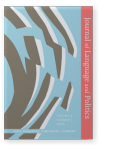Cultural status and language selection in translation
He Xianbin | Guangdong Polytechnic Normal University, China510665
This paper is an attempt to testify with Chinese historical data that the cultural status of a language (or dialect) directly affects the translation flow, legal power of parallel texts, orientations of translators, selection of a TL temporal dialect, etc. It has been discovered that when the actual power of a language and its acknowledgement by translators contradict, the cultural positioning of translators seems more decisive. A distinction must be made between translators as a cultural collectivity and as individuals. Ideology may also interfere with language selection in translation.
TL choice is often influenced by the power of a temporal dialect and its users. Varying with the context, translation for the elites may involve selection of the classical dialect or highly literal and modernizing forms. A language becomes dominant when it is considered the vehicle for advanced technology and thought. Its interaction to translation is hence dynamic.
References (20)
Barbe, Katharina
1996 The dichotomy
Free and Literal translation. Meta
41(3,) 328—337.

Gao, Jian
1994 Relative factors in translation.
Foreign Languages 17(2,) 1—7.

Gao, Yu
2000 Review of Hu Shi's spoken Chinese literary theory.
Journal of Hubei University 27(2,) 45—51.

Hsu, Jia-ling
1994 Englishization and language change in modern Chinese in Taiwan.
World Englishes 13(2,) 167—184.


Lefevere, Andre
(ed 1992 Translation/ History/ Culture. A Sourcebook. London and New York: Routledge.

Luo, Xinzhang
1984 Collection of Translation Studies Papers. Beijing: The Commercial Press.

Ma, Shikui
2003 Foreign literature translation during 'the Cultural Revolution'.
Chinese Translators Journal 24(3,) 65—69.

Samovar, A. Larry
et al. 2000 Communication between Cultures. Beijing: Foreign Language Teaching and Research Press.

Scollon, Ron and Scollon, Suzanne Wong
2000 Intercultural Communication: A Discourse Approach. Beijing: Foreign Language Teaching and Research Press.

Wang, Kefei and Shouyi, Fan
1999 Translation in China: A motivating force.
Meta 44(1,) 7—26.

Wang, Kefei
1997 Cultural History of Translation. Shanghai: Shanghai Foreign Languages Education Press.

Wang, Hongzhi
1999 Reinterpreting Faithfulness, Expressiveness, and Elegance: Translation Studies in the 20th Century China. Shanghai: Oriental Publishing Centre.

Wang, Li
1945 Theories of Chinese Grammar. Chongqing: The Commercial Press.

Wang, Shi
1986 Collection of Yan Fu's Works. Beijing: China Publishing Press.

Wang, Yougui
2003 Ideology and the history of translated literature in the 20th century (1899—1979) China.
Chinese Translators Journal 24(5,) 11—15.

Xu Jianping
et al. 2002 Foreignization and domestication in cross-cultural translation.
Chinese Translators Journal 23(5,) 36—38.

Xu, Shigu
2000 A case study of a linguistic and cultural hegemony. In:
Boran Zhang and
Jun Xu (eds).
Translation Studies in the 21st Century. Beijing: The Commercial Press, 560—564.

Xue, Suizi and Zhang, Juncai
1982 Papers Concerning Lin Shu Studies. Fuzhou: Fujian People's Press.

Yang, Liu
2001 New concepts in translation studies and translation teaching.
Chinese Translators Journal 22(5,) 3—5.

Cited by (3)
Cited by 3 other publications
Chan, Leo Tak-hung
2016.
Japanization and the Chinese “Madman”: Triangulating Takeuchi Yoshimi's philosophy of translation.
Translation Studies 9:1
► pp. 1 ff.

Tak-hung Chan, Leo
2014.
Under the shadow of threelingua francae: repositioning translation in East Asia.
Asia Pacific Translation and Intercultural Studies 1:1
► pp. 12 ff.

This list is based on CrossRef data as of 5 july 2024. Please note that it may not be complete. Sources presented here have been supplied by the respective publishers.
Any errors therein should be reported to them.
